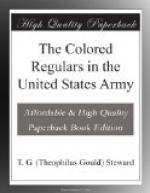The feelings of the six thousand American troops who landed on Cuban soil on June 22nd, 1898, may well be imagined. Although they felt the effects of the confinement to which they had been subjected while on shipboard, there was very little sickness among them. Again possessed of the free use of their limbs they swarmed the beach and open space near the landing, making themselves at home, and confronting the difficulties and perils that lay before them with a courage born of national pride. Before them were the mountains with their almost impassable roads, the jungles filled with poisonous plants and the terrible prickly underbrush and pointed grass, in which skulked the land crab and various reptiles whose bite or sting was dangerous; twenty miles of this inhospitable country lay between them and Santiago, their true objective. And somewhere on the road to that city they knew they were destined to meet a well-trained foe, skilled in all the arts of modern warfare, who would contest their advance. The prospect, however, did not unnerve them, although they could well conjecture that all who landed would not re-embark. Some in that six thousand were destined never again to set foot on shipboard. Out of the Twenty-fifth Infantry and the Tenth Cavalry men were to fall both before Spanish bullets and disease ere these organizations should assemble to return to their native shores. These thoughts did not prevent the men from taking advantage of what nature had to offer them.




